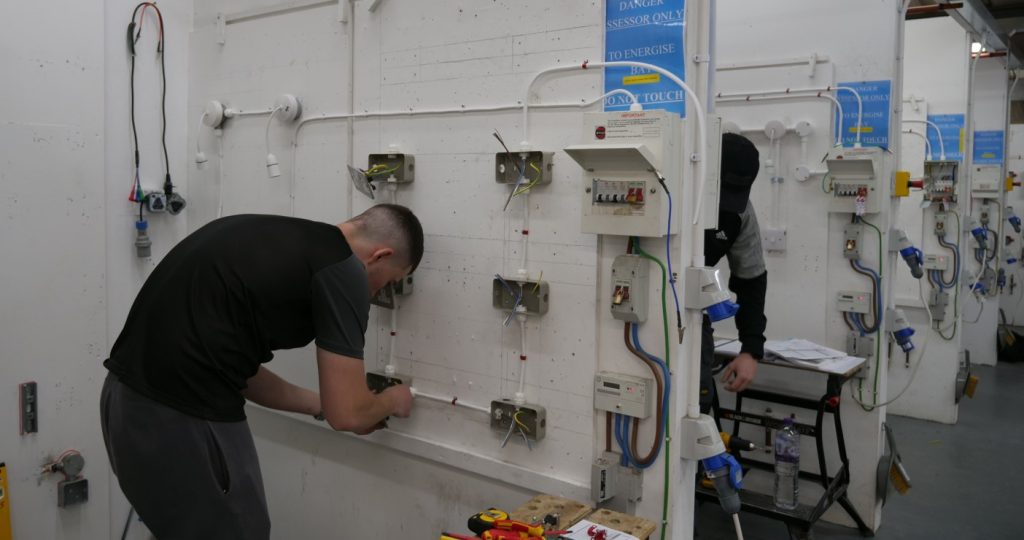
According to a recent study by Rated People, electricians expect to remain in huge demand throughout 2022, with 85% of respondents predicting they’ll be very busy over the current 12-month period.
Those findings are the latest indication that the incredibly high demand that electricians have enjoyed for some time now, is here to stay for the foreseeable future.
Combine that level of healthy job security with a current average UK salary of £37,426 per year, and the career of an electrician quickly becomes an extremely attractive one.
What does an electrician do?
The life of an electrician can be extremely varied, and the kind of tasks that you’ll typically face will depend largely on whether you’re working in a domestic or commercial setting.
Some of the more common jobs can include:
- Checking electrical systems to ensure they’re working safely
- Building and fitting control panels that control electrical systems in buildings
- Repairing electrical motors and transformers in industrial machinery
- Installing street lighting and traffic management systems
- Fitting electrical wiring, sockets and switches in new homes
- Rewiring homes and commercial buildings
Why are training and qualifications so important to the profession?
Given the hazardous nature of working with electricity, health and safety must be at the forefront of your training to protect both yourself and your potential clients. Training under the guidance of experienced tradespeople is also vital when it comes to upholding high standards in the field.
For electricians who want to work on-site, you’ll need to hold a CSCS Card. To register for this you’ll need to pass a health, safety and environment test (HS&E).
While it’s not a legal requirement, it’s common for electricians to register with the National Inspection Council for Electrical Installation Contracting (NICEIC). NICEIC accredited contractors must meet extremely high requirements set by the regulatory body, and is something customers often look for before hiring an electrician as an indication of skill level.
Electrical courses at Able Skills
18th Edition Course: A three-day theory-based electrical training course designed to deliver familiarity with the layout, content and application of BS 7671:2018 — 18th Edition
Regulations. If you have passed your 17th edition (C&G 2382-15) since the last amendment was published, you can take a shorter one-day 18th edition update course.
City & Guilds Level 2 Electrical Course: The C&G 2365 Level 2 is an industry-recognised route for new entrants looking for a career as an electrician. The course is designed to provide and help develop the regulation knowledge and practical skills required for electrical installation work.
City & Guilds Level 3 Electrical Course: The C&G 2365 Level 3 is the industry-recognised route for electricians looking to gain the next level of knowledge and skills, providing an advanced understanding of electrical science, inspection & testing procedures, fault diagnosis and rectification and installation design.
City & Guilds Combined Level 2 & 3 Electrical Course: A discounted package that incorporates the City & Guilds Level 2 and Level 3 courses.
Home Study Electrics Level 2 & 3: Perfect for anyone wanting to train up to a level 3 standard, but who might not be able to commit to traditional training. The Home Study course allows you to complete your theory-based learning from home at your own pace. Both the Level 2 and Level 3 can be undertaken as standalone courses, too.
Gold Card Approved Electrician: An in-depth course of training that exceeds the requirements needed to gain a JIB Gold Card. There is also the option to complete this course on a home study basis.
NVQ Level 3 Electrical Qualification: The NVQ Level 3 is not a training course; it is an assessment of your competence and is mandatory for those who require JIB Gold Card status. The JIB Mature Candidate Route is ideal for anyone with more than five years' experience in the field, but who doesn’t hold a formal Level 3 qualification.
PAT Testing Courses: Aimed at practising electricians, this qualification will help progress individuals within the electrotechnical industry by teaching how to test portable electrical appliances.
Testimonials
“Great training provider and very professional across the board, from the tutors right through to the office staff. 5 stars all round.”
- Ben, Home Study Electrics Level 2
“It was super relaxed, the staff will help you with anything and give you advice along the way which helps a lot when you are changing careers.”Course
- Max, City & Guilds Combined Level 2 & Level 3 Electrical
Flexible electrical training
We’re well aware that traditional trade training simply isn’t feasible for everyone. To make our courses as inclusive and accessible as possible, many electrical courses can be completed on a part-time or home study basis, meaning they can be tailored to fit around prior commitments. For anyone travelling from afar, we also offer affordable accommodation to use while you complete your training.